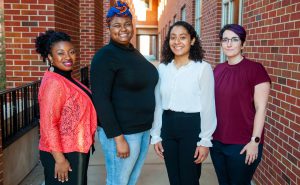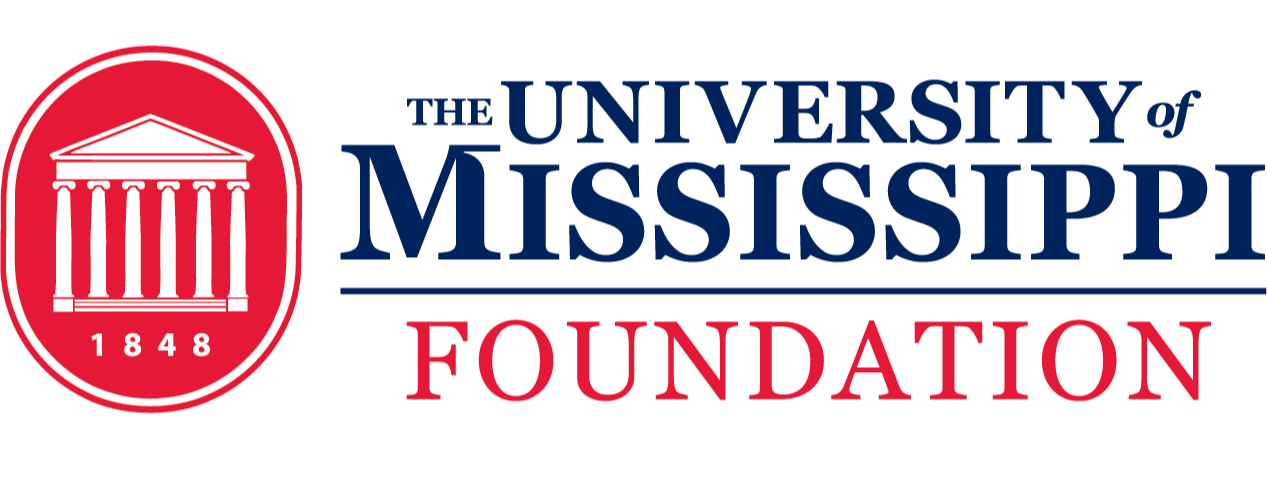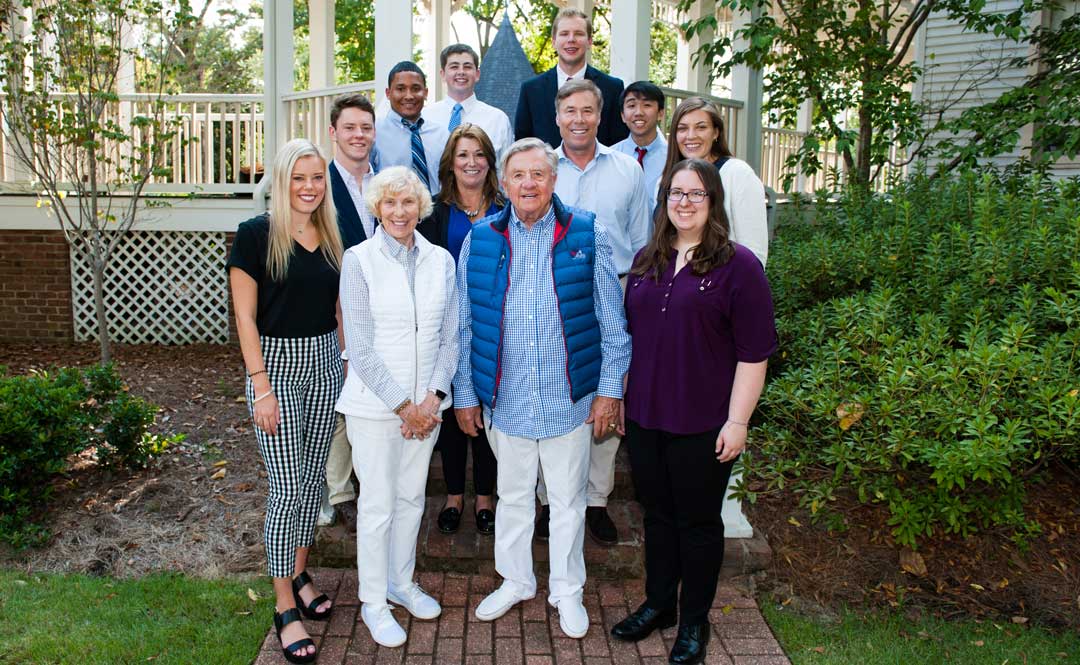Ajah Singleton and Elsi Gabriela Muñoz Ramos, two first-generation students at the University of Mississippi, have discovered a community where they can thrive, thanks to scholarships awarded by the Annexstad Family Foundation.

The students, both members of the university’s Sally McDonnell Barksdale Honors College (SMBHC), are now on a transformative path to career opportunities they wouldn’t have had otherwise.
Additionally, they’ve joined others with common interests in the SMBHC-sponsored Minority Engagement Council (MEC) and the First-Generation Student Network — supportive programs that help ensure students successfully complete their academic journeys.
Having grown up in Mexico, transitioning to the educational system in the United States wasn’t easy four years ago when Muñoz Ramos’ family moved to Pelahatchie, Mississippi.
“In high school, my sister and I felt out of place because we were two of the very few students who were children of immigrants and we were the only two English language learner students in our high school,” said Muñoz Ramos, a freshman international studies major.
“The Minority Engagement Council and the First-Generation Student Network have helped me find a community and feel welcome at the University of Mississippi. Finding people with whom I can relate is one of the most rewarding experiences,” she continued.
“We help, teach and advise each other on how to overcome our struggles and share possible job opportunities and internships.”
The Annexstad Family Foundation, based out of Minnesota, awards three to four Leaders for Tomorrow National Scholarships to Ole Miss students each year.
The Annexstad Scholarship is given to SMBHC students who meet three primary criteria: They must exhibit exceptional potential to become leaders in their chosen fields; they must have successfully triumphed over significant personal or family hardship; and their financial situations would otherwise prevent them from attending college.
“For me, the Minority Engagement Council and the First-Gen Student Network at the Honors College complement the Annexstad Family Foundation Scholarship; all are focused on supporting those who need help,” said Singleton, a junior from Edwards, Mississippi, majoring in health care management in the School of Business Administration. “The MEC and the First-Gen Student Network have given me a community.
“If the Honors College had not established these organizations, I would have been so lonely and isolated,” she said. “But by participating in them, I’m able to discuss different topics with other students in these organizations with ease because I know that everyone around me can truly empathize with me. That is the best peace of mind you can get.”
Beginning a college career can be challenging for any student, but the experience is often more difficult for those who are less familiar with academic and social situations.
The Annexstad Family Foundation, MEC and First-Generation Student Network strive to make this transition easier, said Singleton, president of MEC.
“The MEC helps minority students find communities that benefit them, while First-Gen helps its members find ways to bridge the gap between what they need and where to find it. Both organizations pair students with opportunities and skills they may not have gotten on their own.
“The Annexstad Scholarship helps level the playing field for those who cannot afford their education and who might feel as if they are outliers,” she continued. “All these organizations prioritize equity within the college experience for those who have no resources or experience with which to navigate college.”
Those are results the SMBHC administrators, faculty, staff and students want to achieve.
In early 2018, the Honors College hosted two meetings for Black, indigenous and other students of color to see if there was interest in forming an organization. When more than 50 students crowded into the meetings, staff created MEC, said Rachel Coleman, the council’s advisor.
“I had a bad undergraduate experience myself,” Coleman said. “By either not looking like my peers or else looking like my peers but not being interested in the same things they were, I was basically falling through the cracks. I was not easily classified in one category or another.”
So, on a personal and professional level, Coleman appreciates the MEC mission to “foster an environment that promotes interconnectivity, cultivates greatness in academia and generates a respectful community that opens dialogue for minority students.”
The First-Generation Student Network, launched in 2019, was created to support college students who are the first in their families to pursue a college degree, said Ashleen Williams, the organization’s faculty mentor.
As one herself, she understands the program’s impact.
“This initiative works specifically to dismantle the hidden curriculum,” Williams said. “We focus on service and eliminating the barriers first-generation students might encounter, as well as provide access to a network of resources and people who can help empower them to succeed at our university.”
This is another reason Ole Miss and the Annexstad Family Foundation make a strong team: More than 90% of Annexstad scholars are the first in their families to attend college, and UM is providing guidance needed for this segment of the student population.
A first-generation college student, Ole Miss Chancellor Glenn Boyce is familiar with this background.
Boyce’s family lived in the country in upstate New York, and he enrolled at a small college in New York but soon decided he needed to be in a place with milder winters. While he didn’t know much about the University of Mississippi, he knew it was located in a warmer climate. He gave the school a call and was told to “come on down” so he got in his old, beat-up car and drove more than 1,200 miles to get there.
Boyce ended up thriving at Ole Miss, earning a bachelor’s degree in education and a doctorate in educational leadership as well as meeting his future wife. Before becoming chancellor, Boyce enjoyed a career in secondary and post-secondary education spanning more than 37 years.
“The most pivotal point of my life was based on that phone call over 40 years ago and trusting this university to take care of me,” he said. “I did my part by coming and they certainly did theirs by investing in my success and changing the trajectory of my life. I’m touched and inspired how our partnership with the Annexstad Family Foundation is helping us achieve that same tremendous and personal impact for our students and their future.”
Cathy and Al Annexstad, with their family, created their foundation in 2000 to focus on helping young people earn college degrees. They’ve been awarding scholarships at Ole Miss since 2015.
“Education is the great equalizer,” Al Annexstad said. “While there are no guarantees for any of us, a first-rate education is the surest path to realizing the opportunities that life has to offer.”
Singleton and Muñoz Ramos are on that path now.
Muñoz Ramos hopes to work in international affairs between Mexico and China after college while Singleton plans to become a health care administrator and ultimately serve in executive leadership at a major hospital.
“I’m so thankful to the Annexstad Family Foundation for the financial and academic support they provided me,” Muñoz Ramos said. “I recently contacted the Foundation staff members about my plans after college and they will be able to contact Annexstad alumni and others who can provide me career advice.”
Singleton added: “As a young Black woman in the South from a low-income family, scholarships were the only way I could afford college. Thankfully, I am now an Annexstad Scholar, which has allowed me to come to college in the first place. Now, I can achieve my professional goals and build a better future for myself.”
For more information about the Annexstad Family Foundation Leaders for Tomorrow scholarships, contact Katie Morrison, director of foundation relations and strategic partnerships for the Office of Development, at 662-915-2135 or katie@olemiss.edu, or visit the Annexstad Family Foundation website at http://annexstadfamilyfoundation.org/.
By Jonathan Scott

